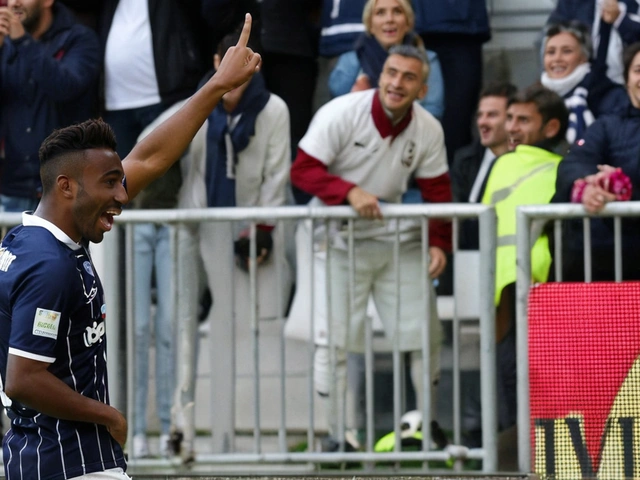Jordan Chiles Shines with Bronze Medal in Gymnastics Comeback
Jordan Chiles, a name that has become synonymous with elite gymnastics, recently returned to the world of competitive gymnastics and made a significant impact. Securing a bronze medal in her latest competition, Chiles has proven that her time away from the sport has not dulled her prowess but has instead fueled her determination to succeed.
Chiles' journey back to the mat has been nothing short of inspiring. After playing a crucial role in securing a gold medal for the U.S. women's gymnastics team at the Tokyo Olympics, she decided to take some time off. This hiatus allowed her to focus on personal growth and recovery—both mentally and physically. For any athlete, stepping away from the sport can be a daunting decision, but Chiles approached it with the same tenacity and resilience that she is known for in gymnastics.
Returning to a sport as demanding as gymnastics is no easy feat. It requires not just physical strength and flexibility, but also mental fortitude. Chiles' comeback is an excellent example of what can be achieved with the right attitude and support system. Her recent win highlights the importance of perseverance and the fact that taking a break does not mean the end of a career; it can be a strategic move for longevity and continued success.
The Path to the Podium
Chiles' journey back to competition began with intensive training. She built upon her already impressive skill set, pushing herself to new heights. Coaches, teammates, and fans alike have watched with admiration as she seamlessly transitioned back into the high-intensity environment of competitive gymnastics. Her dedication to the sport was evident not just in her routines but in her unwavering commitment to every aspect of her training regimen.
The competition in which she won the bronze medal was a tough one, featuring some of the world's best gymnasts. Chiles competed in multiple events, showcasing a level of skill and composure that belied her time away from the sport. Her performances were characterized by exceptional technique, a hallmark of her gymnastics career. Judging by her routines, it was clear that Chiles had used her time off wisely, returning with a refined focus and an even greater drive to excel.
Inspiring the Next Generation
Beyond her accolades and the medal she now proudly wears, Chiles' return has inspired many young gymnasts who look up to her. Her experience highlights that periods of rest and recovery do not only replenish the body but also reinvigorate the spirit. For aspiring gymnasts, Chiles serves as a role model, showing that the path to greatness is not always linear but filled with hills and valleys that test one's resolve.
Chiles' impact resonates not just with young athletes but also with those who may face challenges in their own careers. Her story is a reminder that resilience, coupled with hard work, can lead to remarkable achievements. She has further cemented her role as a pivotal figure in the world of American gymnastics, proving that a hiatus can sometimes be the perfect interval before a triumphant return.
The Road Ahead
Looking ahead, Jordan Chiles has a bright future in gymnastics. With this bronze medal adding to her collection, she is likely setting her sights on more competitions and perhaps even another Olympic appearance. The world will undoubtedly be watching as she continues to break barriers and redefine what it means to be an elite gymnast.
Chiles' return is a powerful story of hope and determination. It underscores the idea that true talent and dedication can withstand the test of time. For now, she can bask in the glory of her well-deserved bronze medal, knowing that this is just one chapter in what promises to be an enduring legacy in the sport of gymnastics.
In a landscape filled with young talents and fierce competition, Jordan Chiles' name stands out, representing excellence and perseverance. Her story is a powerful testament to her character and serves as an inspiration to all who dream of achieving greatness, no matter the obstacles they face.




Jordan's comeback shows that a well‑planned break can actually extend an athlete's prime. Taking time off to reset mentally and physically is something sports psychologists recommend for high‑impact disciplines like gymnastics. It also gives the body a chance to heal lingering micro‑injuries that would otherwise pile up. Coaches who allow their athletes to step away often see a boost in motivation when they return. In Jordan’s case, the bronze medal proves the strategy paid off and sets a solid template for younger gymnasts who feel pressured to grind nonstop.
Her training regimen after the hiatus focused on core stability and progressive skill upgrades the schedule was deliberately paced to avoid overtraining
Honestly it's refreshing to see a star not pretended to be perfect all the time; she’s just a human who needed a breather and now she’s back crushing it.
Bronze? Yeah, that’s all she got after all the hype 😂 the comeback story is overblown and the judges probably felt generous.
The United States continues to dominate the gymnastics arena, and Jordan Chiles exemplifies the rigorous training pipelines that our national programs cultivate. Her recent podium finish not only reinforces American technical superiority but also validates the investment in athlete development pathways that our competitors struggle to match.
Jordan Chiles’ achievement stands as a testament to perseverance and the cultural values of dedication that are esteemed within our sporting community. Her bronze medal adds a dignified chapter to the legacy of American gymnastics.
Wow, a bronze after a break-because apparently upgrading from gold to bronze is the new trend in elite gymnastics progression, huh?
It’s worth noting that break periods can serve as strategic intervals for skill consolidation, which in turn may lead to performance optimization upon return. Athletes often report increased mental clarity after such hiatuses. Moreover, the physiological recuperation afforded by rest cannot be understated. This dual benefit likely contributed to Chiles’ podium success.
Being a fan from Delhi, I remember watching her routines on TV and thinking she’d retire early. Turns out, a pause was just a plot twist. Funny how life mimics sport.
Jordan Chiles’ narrative invites a broader philosophical reflection on the nature of continuity and disruption in human endeavors. When we examine the pattern of her career, we see an oscillation between intense exertion and deliberate withdrawal, a rhythm that mirrors the dialectic of thesis and antithesis. The bronze medal she secured is more than a material token; it is an embodiment of the synthesis that arises when perseverance meets introspection. In elite sport, the prevailing doctrine often idolizes relentless progression, yet Chiles demonstrates that strategic cessation can catalyze renewal. This challenges the monolithic belief that constant training is the sole pathway to excellence. Moreover, her comeback underscores the relational dimension of athletic achievement, highlighting how coaching, peer support, and institutional infrastructure coalesce to foster resilience. The psychological scaffolding she constructed during her hiatus likely fortified her mental fortitude, allowing her to navigate competition pressure with composure. From a sociocultural perspective, her story serves as a counter‑narrative to the myth of the invulnerable hero, reminding us that vulnerability is integral to growth. The medal, therefore, operates as a signifier of both personal triumph and collective validation. Observers should consider how this model can be applied beyond gymnastics, perhaps informing approaches in education, business, and artistic practice. In each domain, the balance between effort and recuperation is essential for sustained innovation. Ultimately, Chiles’ bronze is a testament to the principle that true mastery embraces both action and reflection, forging a resilient identity that can withstand temporal fluctuations. Future generations of gymnasts will likely look to her example when contemplating career pauses. Coaches may begin to incorporate structured sabbaticals into training cycles. Such systemic shifts could redefine the metrics of success across competitive fields.